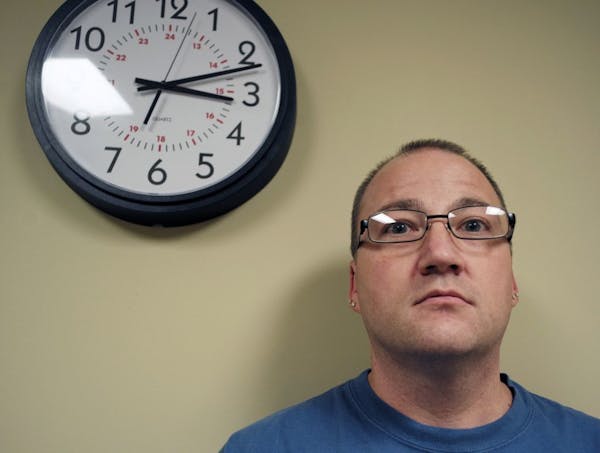Minnesota's sex offender treatment program — under fire in federal court and at the Capitol — needs dramatic changes to insulate it from politics and create more rigorous rules for committing and discharging offenders, an independent task force said Monday.
The state-appointed panel said Minnesota should create a centralized court to oversee the civil commitment of rapists, pedophiles and other sex offenders, and develop options for less violent offenders to be placed in less restrictive settings, among other measures.
"There is broad consensus that the current system of civil commitment captures too many people and keeps many of them too long," according to task force's 18-page report.
Taken broadly, the recommendations seek to remove decisions over the most dangerous sex offenders from the political process by empowering professional experts and judges to oversee the process. About 700 sex offenders are being held indefinitely in high-security treatment centers in Moose Lake and St. Peter, which on average cost three times more than confining sex offenders in prison.
Within hours of the report's release, two influential legislators said they were already in discussions with colleagues on ways to transform the recommendations into legislation for the 2014 session.
Sen. Kathy Sheran, DFL chair of the Senate Health, Human Services and Housing Committee, and Rep. Tina Liebling, DFL-Rochester, said the state needs to find alternatives to locking people away indefinitely, in what many argue is a de facto life sentence.
But the idea of creating another layer of government supervision over sex offenders could be a tough sell in the Legislature, where lawmakers are reluctant to even discuss the politically charged issue of treating serial rapists and child molesters.
The well-publicized, proposed discharge of Thomas Duvall, 58, has the potential to politicize any debate when lawmakers convene in February. Duvall has admitted to attacking at least 60 women, and once tied up a teenage girl with an electrical cord and beat her with a hammer while raping her, according to court documents. An evidentiary hearing on Duvall's proposed discharge is slated for early April, which means his case will reach well into the next legislative session.
Sheran acknowledged that some legislators may find it politically expedient to let a federal judge impose changes rather than tackle the issue next session.
"A certain percentage of [legislators] may want to wash their hands of the problem and say, 'The court came in and made us do this so don't hold us responsible,' " Sheran said.
In 2011, a group of civilly committed sex offenders filed a lawsuit challenging their confinement in the Minnesota Sex Offender Program (MSOP), arguing that the program is unconstitutional and inhumane because almost no one has ever been released and the treatment is inadequate. If a judge rules in their favor, he could order dramatic changes to the program, including the immediate release of offenders.
U.S. District Judge Donovan Frank will begin hearing arguments on the program's constitutionality on Dec. 18.
Former Minnesota Supreme Court Justice Eric Magnuson, chair of the task force, warned in testimony before the Senate Judiciary Committee last month that a federal judge would probably move with "a broad sword, not a scalpel," to reform the system.
'More options'
One of the task force's most controversial recommendations would shift the burden of proof to the state to prove that a sex offender is too dangerous to be released in the community and needs to remain in confinement.
The task force also recommends that the Legislature modify current law to provide for a biennial review of the cases of confined offenders, without requiring that the offender request the review. Unlike other states that civilly commit sex offenders, Minnesota does not allow for automatic, periodic judicial review of those under confinement.
The task force also recommends a "bifurcated" hearing process, in which a new state civil commitment court would first decide if commitment is appropriate and then, at a second hearing, determine the most suitable placement. The process could mean that more sex offenders are committed, but in facilities other than the high-security units at Moose Lake and St. Peter.
"We need more options," Liebling said. "Right now, it's a de facto life sentence at a high-security facility or it's nothing."
The report also contains strong language addressing the commitment of juveniles.
"No person should be civilly committed based solely on behavior that occurred while that person was a juvenile," it says. Some 52 of the 698 people now confined in the MSOP have not been convicted of an adult crime, according to state records.
The size and cost of the MSOP have exploded over the past decade. In 2003, after the kidnapping and murder of college student Dru Sjodin, the state Department of Corrections began recommending more sex offenders for civil commitment. The program's population jumped from 199 in June 2003 to 698 today, and Minnesota now confines more sex offenders per capita than any other state.
"Anything you recommend that makes it harder to put people into the system and easier for them to get out … " Magnuson warned, "will be resisted at some level."
Chris Serres • 612-673-4308
Twitter: @chrisserres

Jill Biden rallies women, teachers for the Biden-Harris ticket in Bloomington speeches

